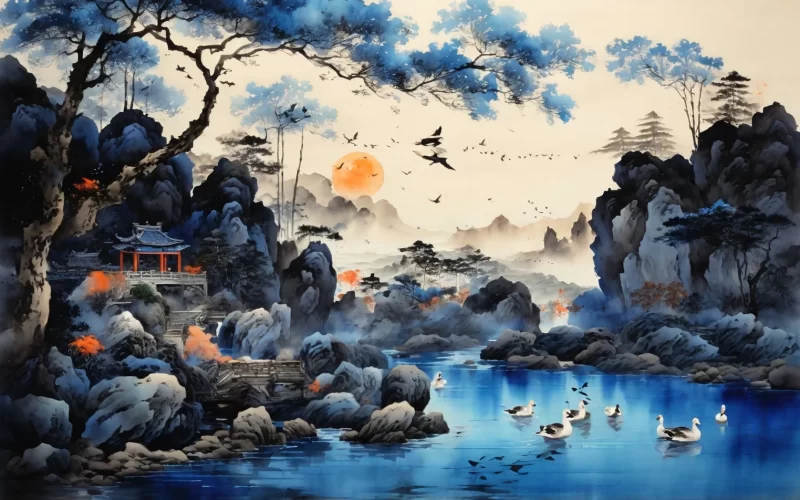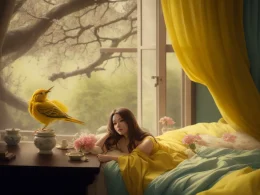Another spring in boat I stay;
Again swallows peck clods of clay.
You know me in my native land;
Now gazing from afar you stand.
Ah, here and there you build your nest;
Now and again I find no rest.
You greet me and then leave the mast;
My tears stream down to see you past.
Original Poem:
「燕子来舟中作」
杜甫
湖南为客动经春,燕子衔泥两度新。
旧入故园尝识主,如今社日远看人。
可怜处处巢居室,何异飘飘托此身。
暂语船樯还起去,穿花贴水益沾巾。
Interpretation:
"To the Swallow Coming to My Boat" is a work by Du Fu during his later years when he was drifting along the rivers and lakes of the Jiangnan region. In 768 AD, after leaving Kuizhou, Du Fu traveled through Hunan, living on a boat for an extended period. His life was marked by displacement and hardship. By this time, Du Fu was nearly sixty years old, plagued by illness, and burdened by worries about his country, the difficulties of life, and the pain of constant wandering. This poem was written in such a lonely and bitter state, using the image of swallows to express his lament over his own rootless and unsettled life.
First Couplet: "湖南为客动经春,燕子衔泥两度新。"
Húnán wéi kè dòng jīng chūn, yànzi xián ní liǎng dù xīn.
I have drifted in Hunan for an entire spring, and the swallows have twice built new nests with mud.
The poet uses the swallows' twice-built nests to imply the long duration of his stay in Hunan, highlighting his prolonged wandering and lack of a stable home. The swallows' "new nests" symbolize their ability to rebuild their homes each year, while the poet remains adrift in the storms of life.
Second Couplet: "旧入故园尝识主,如今社日远看人。"
Jiù rù gù yuán cháng shí zhǔ, rújīn shè rì yuǎn kàn rén.
In the past, you entered my old garden and recognized me as your master, but now, on this spring festival day, you watch me from afar.
Through personification, the poet imbues the swallows with human-like emotions. He regards them as "old acquaintances" from his homeland, but now they can only watch him from a distance, symbolizing his estrangement from his native land and loved ones. This conveys a deep sense of loneliness and melancholy.
Third Couplet: "可怜处处巢居室,何异飘飘托此身。"
Kělián chù chù cháo jū shì, hé yì piāo piāo tuō cǐ shēn.
Pitiable, you build nests everywhere for a home—how different is that from my own drifting, rootless existence?
The poet compares the swallows' "nests everywhere" to his own wandering life, further expressing the bitterness of his nomadic existence. The emotional weight grows heavier as the poet reflects on his own plight.
Fourth Couplet: "暂语船樯还起去,穿花贴水益沾巾。"
Zàn yǔ chuán qiáng hái qǐ qù, chuān huā tiē shuǐ yì zhān jīn.
You pause briefly on the boat's mast to chirp at me, then fly away, skimming the water and weaving through flowers. I cannot help but weep, my tears soaking my handkerchief.
The swallows' brief stay and subsequent departure accentuate the poet's loneliness. Though the swallows seem to understand his plight, they cannot stay, symbolizing the poet's longing for reunion with loved ones and the sorrow of inevitable separation. The image of the poet's tears soaking his handkerchief brings the poem's emotional intensity to its peak.
Overall Appreciation
This poem uses the image of swallows to express Du Fu's pain and rootlessness in his later years. While swallows are typically symbols of spring and warmth, in the poet's eyes, they become emblems of his own wandering existence. The poet's emotions shift from joy to melancholy, from hope to pain, creating a dynamic emotional progression. On the surface, the poem describes swallows, but at its core, it reflects the poet's own desolate circumstances, imbued with profound symbolic meaning.
Writing Characteristics
- Using Objects to Symbolize Human Experience, Blending Scene and Emotion: The poet juxtaposes his own life with the swallows' nest-building, using their departure to symbolize the impermanence of life and the fate of wandering. The emotions are deep and moving.
- Personification, Endowing Swallows with Emotion: By giving the swallows human-like qualities—recognizing their "master," watching from afar, and chirping briefly—the poet makes their image more vivid and their emotions more genuine.
- Layered Emotional Progression: The poem transitions from affection and familiarity toward the swallows to sorrow over his own rootlessness, and finally to tears and lament, deepening the emotional impact.
- Simple Language, Sincere Emotion: The poem uses colloquial expressions that feel natural and intimate, especially the phrase "tears soaking my handkerchief," which is straightforward yet deeply moving and highly evocative.
Insights
This poem not only reveals Du Fu's tumultuous and lonely life in his later years but also conveys the helplessness of human wandering and the unpredictability of fate. Through the swallows, the poet expresses his own pain of displacement, reflecting the destiny of individuals in a turbulent world. The poem reminds us to cherish the warmth around us, hold onto hope, and strive for stability and belonging, no matter the circumstances.
Poem translator:
Xu Yuan-chong (许渊冲)
About the poet

Du Fu (杜甫), 712 - 770 AD, was a great poet of the Tang Dynasty, known as the "Sage of Poetry". Born into a declining bureaucratic family, Du Fu had a rough life, and his turbulent and dislocated life made him keenly aware of the plight of the masses. Therefore, his poems were always closely related to the current affairs, reflecting the social life of that era in a more comprehensive way, with profound thoughts and a broad realm. In his poetic art, he was able to combine many styles, forming a unique style of "profound and thick", and becoming a great realist poet in the history of China.











